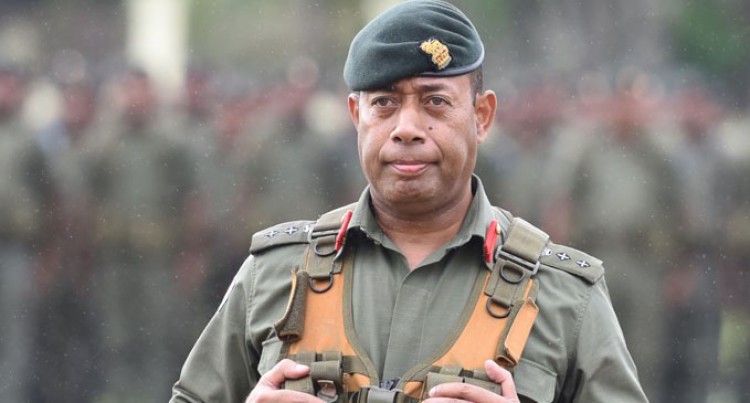The Paradox Of Our Rights During Perilous Times

Opinion:
- The views portrayed herein are not the views of the Republic of Fiji Military Forces but are the personal views of the author himself.
Three years ago, I responded to an article in the Fiji Sun rebutting an opinion by a well-known Fijian political and human rights activist, whose learned opinion of Defence and Security raised the proverbial question, “to what purpose does the RFMF exist”.
I argued of a global sweeping transformation being reshaped by fundamental changes in the nature of risk, political and economic influence, competition and conflict, and the geopolitical balance of power.
With the nature of the conflict, today changing significantly; the world is moving away from formal confrontations between nation-states, but to a world that has now become engrossed with far more complex struggles with internal and trans-border conflicts between powers, identities, religions and ideologies.
Today, such a conflict exists in the form of a global pandemic, unceremoniously breaching our borders as an existential threat – causing global panic, uncertainty, economic shutdowns, overwhelming of health systems and millions of sickness and deaths.
Its technical definition as COVID-19 is a no respecter of the universal norms and rules; breaking boundaries and borders; thriving on our human fundamental nature as social beings and our increasing desire to interact and congregate; functionally dislocating our global communities ability to establish physical contacts through national lockdowns of air and seaports; disrupting the gesturing norms of our human emotions to physically communicate to reach out, share, contact, and touch.
Fortunately for now despite our communal and traditional way of living our numbers are 18 confirmed cases with over two-three hundred suspected through contact tracing, as a result of the government’s immediate response to protect and prevent associated morbidity and mortality.
Like many liberal democracies the world all-over, Fiji right now is in a predicament where it is constantly preparing for and fighting at the same time an invisible adversary in COVID-19, that is likely to end up violating the individual rights and rule of law that are at the heart of any liberal society.
Pandemic and limiting freedom of speech
However, in times of such national emergency such as this global pandemic or war against COVID-19, our leaders have good reasons to stifle criticism of their policies by curtailing freedom of speech and freedom of the press.
They are apt to have deep concerns about this enemy within, which have been fuelled by irresponsible citizens selfishly breaking mandatory curfews, social distancing requirements and questioning the rationale of our leader’s decision to impose such restrictions.
These reactions when maliciously aired on social media can become very contagious with fear and confusion becoming the order of the day.
This general atmosphere of suspicion invariably leads to further public discontent requiring authorities to enforce stronger restrictions on individual rights and the likely invasion of privacy through monitoring programmes of our citizens.
Protect the vulnerable
But leaders do not act this way because they are evil. The bottom line for any government is the due diligence and responsibility to protect the vulnerable against any physical impairment or loss of life.
To do so, certain rights need to be curtailed under more strict conditions. Given the trade-off between security and civil liberties in dire times, or what are perceived to be dire times, policymakers almost always choose security. A country’s highest goal has to be its survival because if it does not survive, it cannot pursue any other goals.
The exaggerated fear of threats both foreign and domestic have permeated many nations foreign and domestic policies, where the most epoch of changes in the past decades was established after 9/11, unsurprisingly many countries today with the war against COVID-19 are now pursuing such policies that will potentially diminish civil liberties at home.
Mobile screening and personal info
For the purpose of this article, there are three policy examples which I feel will certainly be impacted by the current circumstances resulting in the potential reoccurrence of civil liberties being undermined: the first of which involves the ‘right to privacy’.
The recent conduct of mobile screening clinics by the Ministry of Health and Medical Services (with the RFMF in support) have brought up a huge discussion on social media questioning the screening process indicating it was an invasion of their individual privacy.
This unfortunately led to some citizens questioning and refusing the logic and right of our health officers to do their job in the wake of this existential threat in COVID-19.
Generally speaking, the Government during normal circumstances cannot gather information on its citizens without a judge’s authorisation or as legislated by law.
To obtain such authorisation a search warrant is mandatory and investigators must show there is probable cause to think an individual is engaging in illegal activity.
Even when the government thinks someone is dangerous or behaving unlawfully, it ordinarily cannot act without a legislated approval.
Protection of society must take precedent
The second example of policies that undermine civil liberties concerns ‘due process’, which lies at the very core of our constitutional protections and is the backbone of the rule of law.
It is no exaggeration to say that this has been applied in the global war on terror, where the traditional notion of due process for terrorism has become laughable.
Just recently, a very learned local lawyer posted on his Facebook page indicating “there was no time to be toying about due process”, given the existential threat in Fiji today.
His argument was that the “protection of society from this virus must take precedent” requiring the enforcement of the Crime Control Model over the Due Process Model during this difficult time for our country. It must be understood today that any arbitrary and unprecedented policy by the government in undermining our civil liberties for the purpose of fighting the global pandemic locally has the potential of violating most commonly held notions of ‘due process’.
Choice of life and death
The third example is founded on the unsuspecting nature of the virus in spreading rapidly in the various countries around the world by human carriers taking authorities by surprise resulting in their health systems being overwhelmed.
Like the case of Italy, the choice of life and death became the responsibility of the state determining those who should be cared for medically than providing the right to life for all.
Right now, with medical systems being overwhelmed and the increasing number of those infected and deaths, there isn’t a government on the planet today that does not agree with this rationale to life for those who are deemed as more able in prolonging the survivability of the state from those whose lives are at the more-older generation of decline.
It is the state’s last straw to safeguarding its survival as a nation, people and identity.
For our little country, God forbid, such a policy decision impinging on the right to life would be the most dreaded decision any leader would have to seriously consider given our lesser population and very limited health capacity that cannot fully guarantee on its own, our very own survivability as a people.
Our problem
So, perhaps the problem we face today is not that categories which have long been clear have suddenly become hazy; perhaps the problem we have is that we have briefly convinced ourselves of the permanence and clarity of lines drawn in the sand.
But all this could change once more.
The globalisation of human rights discourse has never been entirely consistent, and it may not even endure. But if we believe that a world in which governments respect basic rights and the rule of law is a better world than one in which they don’t, then we should be troubled by the recent blurring and expansion of the powers and responsibilities by the government under the current circumstances. If the rules they have created for complexities stay the same, but complexities continue to expand into more complicated scenarios, we will eventually find ourselves living permanently under illiberal conditions that undermine our civil liberties.
It may be tempting to shrug all of this off as unduly melodramatic.
Yes, the world is changing, and our laws and institutions may now be badly out of sync with the realities of the world in which we live, but why treat this as an urgent problem requiring our collective attention?
Adapting laws
Throughout history, we humans have always managed, eventually, to adapt our laws and institutions in response to changing conditions.
Perhaps we will muddle through once more, and our laws and institutions will evolve in constructive ways without need of any anxious efforts to steer them. Perhaps today’s governing system will gradually and peacefully morph into a more stable, equitable and effective system of governance without any conscious collective effort on our part. Or, perhaps instead we will become an increasingly repressive and Orwellian state, and an increasingly vicious and unstable political order.
Change therefore is inevitable, but not inevitable for the better; even when the ultimate outcome is good, the process change may be neither pleasant nor gentle. It will take both a concerted effort and a whole lot of luck for us to staffer and stumble our way toward a stronger, more stable, and more human-rights friendly system of law and institutions. If we don’t bother to make an effort and sit down in the comforts of our homes judging and criticizing the current efforts, then we may run out of luck and time, and find ourselves, all too quickly, back in an era of domestic repression and bloody conflict.
Feedback: [email protected]









